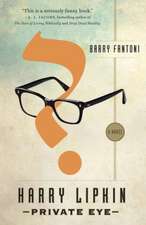Portuguese Irregular Verbs: Professor Dr Von Igelfeld Entertainment, cartea 1
Autor Alexander McCall Smithen Limba Engleză Paperback – 30 noi 2004
The Professor Dr. von Igelfeld Entertainment series slyly skewers academia, chronicling the comic misadventures of the endearingly awkward Professor Dr. Moritz-Maria von Igelfeld, and his long-suffering colleagues at the Institute of Romantic Philology in Germany.
Readers who fell in love with Precious Ramotswe, proprietor of The No. 1 Ladies’ Detective Agency, now have new cause for celebration in the protagonist of these three light-footed comic novels by Alexander McCall Smith. Welcome to the insane and rarified world of Professor Dr. Moritz-Maria von Igelfeld of the Institute of Romance Philology. Von Igelfeld is engaged in a never-ending quest to win the respect he feels certain he is dueߝa quest which has the tendency to go hilariously astray.
In Portuguese Irregular Verbs, Professor Dr von Igelfeld learns to play tennis, and forces a college chum to enter into a duel that results in a nipped nose. He also takes a field trip to Ireland where he becomes acquainted with the rich world of archaic Irishisms, and he develops an aching infatuation with a Dentist fatale. Along the way, he takes two ill-fated Italian sojourns, the first merely uncomfortable, the second definitely dangerous.
Preț: 86.09 lei
Nou
Puncte Express: 129
Preț estimativ în valută:
16.48€ • 17.14$ • 13.60£
16.48€ • 17.14$ • 13.60£
Carte tipărită la comandă
Livrare economică 15-29 aprilie
Preluare comenzi: 021 569.72.76
Specificații
ISBN-13: 9781400077083
ISBN-10: 1400077087
Pagini: 128
Dimensiuni: 130 x 203 x 10 mm
Greutate: 0.11 kg
Ediția:Anchor Books.
Editura: Anchor Books
Seria Professor Dr Von Igelfeld Entertainment
ISBN-10: 1400077087
Pagini: 128
Dimensiuni: 130 x 203 x 10 mm
Greutate: 0.11 kg
Ediția:Anchor Books.
Editura: Anchor Books
Seria Professor Dr Von Igelfeld Entertainment
Notă biografică
ALEXANDER McCALL SMITH is the author of the No. 1 Ladies' Detective Agency series, the Isabel Dalhousie series, the Portuguese Irregular Verbs series, the 44 Scotland Street series, and the Corduroy Mansions series. He is professor emeritus of medical law at the University of Edinburgh in Scotland and has served with many national and international organizations concerned with bioethics. He was born in what is now known as Zimbabwe and was a law professor at the University of Botswana. He lives in Scotland. Visit his website at www.alexandermccallsmith.com.
Extras
eins
THE PRINCIPLES OF TENNIS
PROFESSOR DR MORITZ-MARIA VON IGELFELD often reflected on how fortunate he was to be exactly who he was, and nobody else. When one paused to think of who one might have been had the accident of birth not happened precisely as it did, then, well, one could be quite frankly appalled. Take his colleague Professor Dr Detlev Amadeus Unterholzer, for instance. Firstly, there was the name: to be called Detlev was a misfortune, but to add that ridiculous Mozartian pretension to it, and then to culminate in Unterholzer was to gild a turnip. But if one then considered Unterholzer's general circumstances, then Pelion was surely piled upon Ossa. Unterholzer had the double misfortune of coming from an obscure potato-growing area somewhere, a place completely without consequence, and of being burdened in this life with a large and inelegant nose. This, of course, was not something for which he could be blamed, but one might certainly criticise him, thought von Igelfeld, for carrying his nose in the way he did. A difficult nose, which can afflict anybody, may be kept in the background by a modest disposition of the head; Unterholzer, by contrast, thrust his nose forward shamelessly, as might an anteater, with the result that it was the first thing one saw when he appeared anywhere. It was exactly the wrong thing to do if one had a nose like that.
The von Igelfeld nose, by contrast, was entirely appropriate. It was not small, but then a small nose is perhaps as much of a misfortune as a large nose, lending the wearer an appearance of pettiness or even irrelevance. Von Igelfeld's nose tended slightly to the aquiline, which was completely becoming for the scion of so distinguished a family. The von Igelfeld name was an honourable one: Igel meant hedgehog in German, and von Igelfeld, therefore, was hedgehogfield, an irreproachable territorial reference that was reflected in the family coat of arms--a hedgehog recumbent upon a background of vert. Unterholzer, of course, might snigger at the hedgehog, but what could he do but snigger, given that he had no armorial claims, whatever his pretensions in that direction might be.
But even if von Igelfeld was relieved that he was not Unterholzer, then he had to admit to himself that he would have been perfectly happy to have been Professor Dr Dr (honoris causa) Florianus Prinzel, another colleague at the Institute of Romance Philology. Prinzel was a fine man and a considerable scholar, whom von Igelfeld had met when they were both students, and whom he had long unconditionally admired. Prinzel was the athlete-poet; von Igelfeld the scholar--well, scholar-scholar one would probably have to say. If von Igelfeld had been asked to stipulate a Platonic von Igelfeld, an ideal template for all von Igelfelds, then he would have chosen Prinzel for this without the slightest hesitation.
Of the three professors, von Igelfeld was undoubtedly the most distinguished. He was the author of a seminal work on Romance philology, Portuguese Irregular Verbs, a work of such majesty that it dwarfed all other books in the field. It was a lengthy book of almost twelve hundred pages, and was the result of years of research into the etymology and vagaries of Portuguese verbs. It had been well received--not that there had ever been the slightest doubt about that--and indeed one reviewer had simply written, 'There is nothing more to be said on this subject. Nothing.' Von Igelfeld had taken this compliment in the spirit in which it had been intended, but there was in his view a great deal more to be said, largely by way of exposition of some of the more obscure or controversial points touched upon in the book, and for many years he continued to say it. This was mostly done at conferences, where von Igelfeld's papers on Portuguese irregular verbs were often the highlight of proceedings. Not that this eminence always bore the fruit that might be expected: unfortunately it was Prinzel, not von Igelfeld, who had received the honorary doctorate from the University of Palermo, and many people, including von Igelfeld, thought that this might be a case of mistaken identity. After all, from the viewpoint of the fairly diminutive Sicilian professors who bestowed the honour, three tall Germans might have been difficult to tell apart. These doubts, however, were never aired, as that would have been a breach of civility and a threat to the friendship. But just as the doubts were never mentioned, neither was the honorary doctorate.
At the Annual Congress of Romance Philology in Zürich, the three professors decided to stay in a small village on the edge of the lake. There was an excellent train which took them into the city each morning for the meeting, and in the evening they could even return by the regular boat, which called at the jetty no more than five minutes from the hotel. It was altogether a much more satisfactory arrangement than staying in Zürich itself, surrounded by banks and expensive watch shops. As von Igelfeld remarked to the others: 'Have you noticed how Zürich ticks? Klummit, klummit, ding! I could never sleep in such a town.'
The Hotel Carl-Gustav, in which the three professors stayed, was a large old-fashioned establishment, much favoured by families from Zürich who wanted to get away, but not too far away. Anxious bankers, into whose very bones the Swiss work ethic had penetrated, stayed there for their holidays. It was highly convenient for them, as they could tell their wives they were going for a walk in the hotel grounds and then slip off to the railway station and be in their offices in Zürich within twenty minutes. They could then return two hours later, to pretend that they had been in the woods or at the lakeside; whereas in reality they had been accepting deposits and discounting bills of exchange. In this way, certain Zürich financiers had acquired the reputation of never going on holiday at all, which filled their rivals with feelings of dread and guilt.
Prinzel had arrived first, and taken the best room, the one with the uninterrupted view of the lake. He had felt slightly uneasy about this, as it was a room which should really have gone to von Igelfeld, who always got the best of everything on the strength of Portuguese Irregular Verbs. For this reason Prinzel was careful not to mention the view and contrived to keep von Igelfeld out of his room so he could not see it for himself. Unterholzer, who always got the worst of what was on offer, had a slightly gloomy room at the side of the hotel, above the dining room, and his view was that of the hotel tennis court.
'I look out on to the tennis court,' he announced one evening as the three gathered for a glass of mineral water on the hotel terrace.
'Ah!' said von Igelfeld. 'And have you seen people playing on this tennis court?'
'I saw four Italian guests using it,' said Prinzel. 'They played a very energetic game until one of them appeared to have a heart attack and they stopped.'
The three professors contemplated this remarkable story for a few moments. Even here, in these perfect surroundings, where everything was so safe, so assured, mortality could not be kept at bay. The Swiss could guarantee everything, could coordinate anything--but ultimately mortality was no respecter of timetables.
Then Prinzel had an idea. Tennis did not look too difficult; the long summer evening stretched out before them, and the court, since the sudden departure of the Italians, was empty.
'We could, perhaps, have a game of tennis ourselves,' he suggested.
The others looked at him.
'I've never played,' said von Igelfeld.
'Nor I,' said Unterholzer. 'Chess, yes. Tennis, no.'
'But that's no reason not to play,' von Igelfeld added quickly. 'Tennis, like any activity, can be mastered if one knows the principles behind it. In that respect it must be like language. The understanding of simple rules produces an understanding of a language. What could be simpler?'
Unterholzer and Prinzel agreed, and Prinzel was despatched to speak to the manager of the hotel to find out whether tennis equipment, and a book of the rules of tennis, could be borrowed. The manager was somewhat surprised at the request for the book, but in an old hotel most things can be found and he eventually came up with an ancient dog-eared handbook from the games cupboard. This was The Rules of Lawn Tennis by Captain Geoffrey Pembleton BA (Cantab.), tennis Blue, sometime county champion of Cambridgeshire; and published in 1923, before the tie-breaker was invented.
Armed with Pembleton's treatise, described by von Igelfeld, to the amusement of the others, as 'this great work of Cambridge scholarship', the three professors strode confidently on to the court. Captain Pembleton had thoughtfully included several chapters describing tennis technique, and here all the major strokes were illustrated with little dotted diagrams showing the movement of the arms and the disposition of the body.
It took no more than ten minutes for von Igelfeld and Prinzel to feel sufficiently confident to begin a game. Unterholzer sat on a chair at the end of the net, and declared himself the umpire. The first service, naturally, was taken by von Igelfeld, who raised his racquet in the air as recommended by Captain Pembleton, and hit the ball in the direction of Prinzel.
The tennis service is not a simple matter, and unfortunately von Igelfeld did not manage to get any of his serves over the net. Everything was a double fault.
'Love 15; Love 30; Love 40; Game to Professor Dr Prinzel!' called out Unterholzer. 'Professor Dr Prinzel to serve!'
Prinzel, who had been waiting patiently to return von Igelfeld's serve, his feet positioned in exactly the way advised by Captain Pembleton, now quickly consulted the book to refresh his memory. Then, throwing the tennis ball high into the air, he brought his racquet down with convincing force and drove the ball into the net. Undeterred, he tried again, and again after that, but the score remained obstinately one-sided.
'Love 15; Love 30; Love 40; Game to Professor Dr von Igelfeld!' Unterholzer intoned. 'Professor Dr von Igelfeld to serve!'
And so it continued, as the number of games mounted up. Neither player ever succeeded in winning a game other than by the default of the server. At several points the ball managed to get across the net, and on one or two occasions it was even returned; but this was never enough to result in the server's winning a game. Unterholzer continued to call out the score and attracted an occasional sharp glance from von Igelfeld, who eventually suggested that the Rules of Lawn Tennis be consulted to see who should win in such circumstances.
Unfortunately there appeared to be no answer. Captain Pembleton merely said that after six games had been won by one player this was a victory--provided that such a player was at least two games ahead of his opponent. If he was not in such a position, then the match must continue until such a lead was established. The problem with this, though, was that von Igelfeld and Prinzel, never winning a service, could never be more than one game ahead of each other.
This awkward, seemingly irresoluble difficulty seemed to all of them to be a gross flaw in the theoretical structure of the game.
'This is quite ridiculous,' snorted von Igelfeld. 'A game must have a winner--everybody knows that--and yet this . . . this stupid book makes no provision for moderate players like ourselves!'
'I agree,' said Prinzel, tossing down his racquet. 'Unterholzer, what about you?'
'I'm not interested in playing such a flawed game,' said Unterholzer, with a dismissive gesture towards The Rules of Lawn Tennis. 'So much for Cambridge!'
They trooped off the tennis court, not noticing the faces draw back rapidly from the windows. Rarely had the Hotel Carl-Gustav provided such entertainment for its guests.
'Well,' said Prinzel. 'I'm rather hot after all that sport. I could do with a swim.'
'A good idea,' said von Igelfeld. 'Perhaps we should do that.'
'Do you swim?' asked Unterholzer, rather surprised by the sudden burst of physical activity.
'Not in practice,' said von Igelfeld. 'But it has never looked difficult to me. One merely extends the arms in the appropriate motion and then retracts them, thereby propelling the body through the water.'
'That's quite correct,' said Prinzel. 'I've seen it done many times. In fact, this morning some of the other guests were doing it from the hotel jetty. We could borrow swimming costumes from the manager.'
'Then let's all go and swim,' said von Igelfeld, enthusiastically. 'Dinner's not for another hour or so, and it would refresh us all,' adding, with a glance at Unterholzer, 'players and otherwise.'
The waters were cool and inviting. Out on the lake, the elegant white yachts dipped their tall sails in the breeze from the mountains. From where they stood on the jetty, the three professors could, by craning their necks, see the point where Jung in his study had pondered our collective dreams. As von Igelfeld had pointed out, swimming was simple, in theory.
Inside the Hotel Carl-Gustav, the watching guests waited, breathless in their anticipation.
THE PRINCIPLES OF TENNIS
PROFESSOR DR MORITZ-MARIA VON IGELFELD often reflected on how fortunate he was to be exactly who he was, and nobody else. When one paused to think of who one might have been had the accident of birth not happened precisely as it did, then, well, one could be quite frankly appalled. Take his colleague Professor Dr Detlev Amadeus Unterholzer, for instance. Firstly, there was the name: to be called Detlev was a misfortune, but to add that ridiculous Mozartian pretension to it, and then to culminate in Unterholzer was to gild a turnip. But if one then considered Unterholzer's general circumstances, then Pelion was surely piled upon Ossa. Unterholzer had the double misfortune of coming from an obscure potato-growing area somewhere, a place completely without consequence, and of being burdened in this life with a large and inelegant nose. This, of course, was not something for which he could be blamed, but one might certainly criticise him, thought von Igelfeld, for carrying his nose in the way he did. A difficult nose, which can afflict anybody, may be kept in the background by a modest disposition of the head; Unterholzer, by contrast, thrust his nose forward shamelessly, as might an anteater, with the result that it was the first thing one saw when he appeared anywhere. It was exactly the wrong thing to do if one had a nose like that.
The von Igelfeld nose, by contrast, was entirely appropriate. It was not small, but then a small nose is perhaps as much of a misfortune as a large nose, lending the wearer an appearance of pettiness or even irrelevance. Von Igelfeld's nose tended slightly to the aquiline, which was completely becoming for the scion of so distinguished a family. The von Igelfeld name was an honourable one: Igel meant hedgehog in German, and von Igelfeld, therefore, was hedgehogfield, an irreproachable territorial reference that was reflected in the family coat of arms--a hedgehog recumbent upon a background of vert. Unterholzer, of course, might snigger at the hedgehog, but what could he do but snigger, given that he had no armorial claims, whatever his pretensions in that direction might be.
But even if von Igelfeld was relieved that he was not Unterholzer, then he had to admit to himself that he would have been perfectly happy to have been Professor Dr Dr (honoris causa) Florianus Prinzel, another colleague at the Institute of Romance Philology. Prinzel was a fine man and a considerable scholar, whom von Igelfeld had met when they were both students, and whom he had long unconditionally admired. Prinzel was the athlete-poet; von Igelfeld the scholar--well, scholar-scholar one would probably have to say. If von Igelfeld had been asked to stipulate a Platonic von Igelfeld, an ideal template for all von Igelfelds, then he would have chosen Prinzel for this without the slightest hesitation.
Of the three professors, von Igelfeld was undoubtedly the most distinguished. He was the author of a seminal work on Romance philology, Portuguese Irregular Verbs, a work of such majesty that it dwarfed all other books in the field. It was a lengthy book of almost twelve hundred pages, and was the result of years of research into the etymology and vagaries of Portuguese verbs. It had been well received--not that there had ever been the slightest doubt about that--and indeed one reviewer had simply written, 'There is nothing more to be said on this subject. Nothing.' Von Igelfeld had taken this compliment in the spirit in which it had been intended, but there was in his view a great deal more to be said, largely by way of exposition of some of the more obscure or controversial points touched upon in the book, and for many years he continued to say it. This was mostly done at conferences, where von Igelfeld's papers on Portuguese irregular verbs were often the highlight of proceedings. Not that this eminence always bore the fruit that might be expected: unfortunately it was Prinzel, not von Igelfeld, who had received the honorary doctorate from the University of Palermo, and many people, including von Igelfeld, thought that this might be a case of mistaken identity. After all, from the viewpoint of the fairly diminutive Sicilian professors who bestowed the honour, three tall Germans might have been difficult to tell apart. These doubts, however, were never aired, as that would have been a breach of civility and a threat to the friendship. But just as the doubts were never mentioned, neither was the honorary doctorate.
At the Annual Congress of Romance Philology in Zürich, the three professors decided to stay in a small village on the edge of the lake. There was an excellent train which took them into the city each morning for the meeting, and in the evening they could even return by the regular boat, which called at the jetty no more than five minutes from the hotel. It was altogether a much more satisfactory arrangement than staying in Zürich itself, surrounded by banks and expensive watch shops. As von Igelfeld remarked to the others: 'Have you noticed how Zürich ticks? Klummit, klummit, ding! I could never sleep in such a town.'
The Hotel Carl-Gustav, in which the three professors stayed, was a large old-fashioned establishment, much favoured by families from Zürich who wanted to get away, but not too far away. Anxious bankers, into whose very bones the Swiss work ethic had penetrated, stayed there for their holidays. It was highly convenient for them, as they could tell their wives they were going for a walk in the hotel grounds and then slip off to the railway station and be in their offices in Zürich within twenty minutes. They could then return two hours later, to pretend that they had been in the woods or at the lakeside; whereas in reality they had been accepting deposits and discounting bills of exchange. In this way, certain Zürich financiers had acquired the reputation of never going on holiday at all, which filled their rivals with feelings of dread and guilt.
Prinzel had arrived first, and taken the best room, the one with the uninterrupted view of the lake. He had felt slightly uneasy about this, as it was a room which should really have gone to von Igelfeld, who always got the best of everything on the strength of Portuguese Irregular Verbs. For this reason Prinzel was careful not to mention the view and contrived to keep von Igelfeld out of his room so he could not see it for himself. Unterholzer, who always got the worst of what was on offer, had a slightly gloomy room at the side of the hotel, above the dining room, and his view was that of the hotel tennis court.
'I look out on to the tennis court,' he announced one evening as the three gathered for a glass of mineral water on the hotel terrace.
'Ah!' said von Igelfeld. 'And have you seen people playing on this tennis court?'
'I saw four Italian guests using it,' said Prinzel. 'They played a very energetic game until one of them appeared to have a heart attack and they stopped.'
The three professors contemplated this remarkable story for a few moments. Even here, in these perfect surroundings, where everything was so safe, so assured, mortality could not be kept at bay. The Swiss could guarantee everything, could coordinate anything--but ultimately mortality was no respecter of timetables.
Then Prinzel had an idea. Tennis did not look too difficult; the long summer evening stretched out before them, and the court, since the sudden departure of the Italians, was empty.
'We could, perhaps, have a game of tennis ourselves,' he suggested.
The others looked at him.
'I've never played,' said von Igelfeld.
'Nor I,' said Unterholzer. 'Chess, yes. Tennis, no.'
'But that's no reason not to play,' von Igelfeld added quickly. 'Tennis, like any activity, can be mastered if one knows the principles behind it. In that respect it must be like language. The understanding of simple rules produces an understanding of a language. What could be simpler?'
Unterholzer and Prinzel agreed, and Prinzel was despatched to speak to the manager of the hotel to find out whether tennis equipment, and a book of the rules of tennis, could be borrowed. The manager was somewhat surprised at the request for the book, but in an old hotel most things can be found and he eventually came up with an ancient dog-eared handbook from the games cupboard. This was The Rules of Lawn Tennis by Captain Geoffrey Pembleton BA (Cantab.), tennis Blue, sometime county champion of Cambridgeshire; and published in 1923, before the tie-breaker was invented.
Armed with Pembleton's treatise, described by von Igelfeld, to the amusement of the others, as 'this great work of Cambridge scholarship', the three professors strode confidently on to the court. Captain Pembleton had thoughtfully included several chapters describing tennis technique, and here all the major strokes were illustrated with little dotted diagrams showing the movement of the arms and the disposition of the body.
It took no more than ten minutes for von Igelfeld and Prinzel to feel sufficiently confident to begin a game. Unterholzer sat on a chair at the end of the net, and declared himself the umpire. The first service, naturally, was taken by von Igelfeld, who raised his racquet in the air as recommended by Captain Pembleton, and hit the ball in the direction of Prinzel.
The tennis service is not a simple matter, and unfortunately von Igelfeld did not manage to get any of his serves over the net. Everything was a double fault.
'Love 15; Love 30; Love 40; Game to Professor Dr Prinzel!' called out Unterholzer. 'Professor Dr Prinzel to serve!'
Prinzel, who had been waiting patiently to return von Igelfeld's serve, his feet positioned in exactly the way advised by Captain Pembleton, now quickly consulted the book to refresh his memory. Then, throwing the tennis ball high into the air, he brought his racquet down with convincing force and drove the ball into the net. Undeterred, he tried again, and again after that, but the score remained obstinately one-sided.
'Love 15; Love 30; Love 40; Game to Professor Dr von Igelfeld!' Unterholzer intoned. 'Professor Dr von Igelfeld to serve!'
And so it continued, as the number of games mounted up. Neither player ever succeeded in winning a game other than by the default of the server. At several points the ball managed to get across the net, and on one or two occasions it was even returned; but this was never enough to result in the server's winning a game. Unterholzer continued to call out the score and attracted an occasional sharp glance from von Igelfeld, who eventually suggested that the Rules of Lawn Tennis be consulted to see who should win in such circumstances.
Unfortunately there appeared to be no answer. Captain Pembleton merely said that after six games had been won by one player this was a victory--provided that such a player was at least two games ahead of his opponent. If he was not in such a position, then the match must continue until such a lead was established. The problem with this, though, was that von Igelfeld and Prinzel, never winning a service, could never be more than one game ahead of each other.
This awkward, seemingly irresoluble difficulty seemed to all of them to be a gross flaw in the theoretical structure of the game.
'This is quite ridiculous,' snorted von Igelfeld. 'A game must have a winner--everybody knows that--and yet this . . . this stupid book makes no provision for moderate players like ourselves!'
'I agree,' said Prinzel, tossing down his racquet. 'Unterholzer, what about you?'
'I'm not interested in playing such a flawed game,' said Unterholzer, with a dismissive gesture towards The Rules of Lawn Tennis. 'So much for Cambridge!'
They trooped off the tennis court, not noticing the faces draw back rapidly from the windows. Rarely had the Hotel Carl-Gustav provided such entertainment for its guests.
'Well,' said Prinzel. 'I'm rather hot after all that sport. I could do with a swim.'
'A good idea,' said von Igelfeld. 'Perhaps we should do that.'
'Do you swim?' asked Unterholzer, rather surprised by the sudden burst of physical activity.
'Not in practice,' said von Igelfeld. 'But it has never looked difficult to me. One merely extends the arms in the appropriate motion and then retracts them, thereby propelling the body through the water.'
'That's quite correct,' said Prinzel. 'I've seen it done many times. In fact, this morning some of the other guests were doing it from the hotel jetty. We could borrow swimming costumes from the manager.'
'Then let's all go and swim,' said von Igelfeld, enthusiastically. 'Dinner's not for another hour or so, and it would refresh us all,' adding, with a glance at Unterholzer, 'players and otherwise.'
The waters were cool and inviting. Out on the lake, the elegant white yachts dipped their tall sails in the breeze from the mountains. From where they stood on the jetty, the three professors could, by craning their necks, see the point where Jung in his study had pondered our collective dreams. As von Igelfeld had pointed out, swimming was simple, in theory.
Inside the Hotel Carl-Gustav, the watching guests waited, breathless in their anticipation.
Recenzii
“In the halls of academe, a setting fraught with ego-driven battles for power and prestige [Alexander McCall Smith] has rendered yet another one-of-a-kind character: the bumbling but brilliant Dr. Mortiz-Maria von Igelfeld . . . . [a] deftly rendered trilogy [with] endearingly eccentric characters.” —Chicago Sun-Times

















